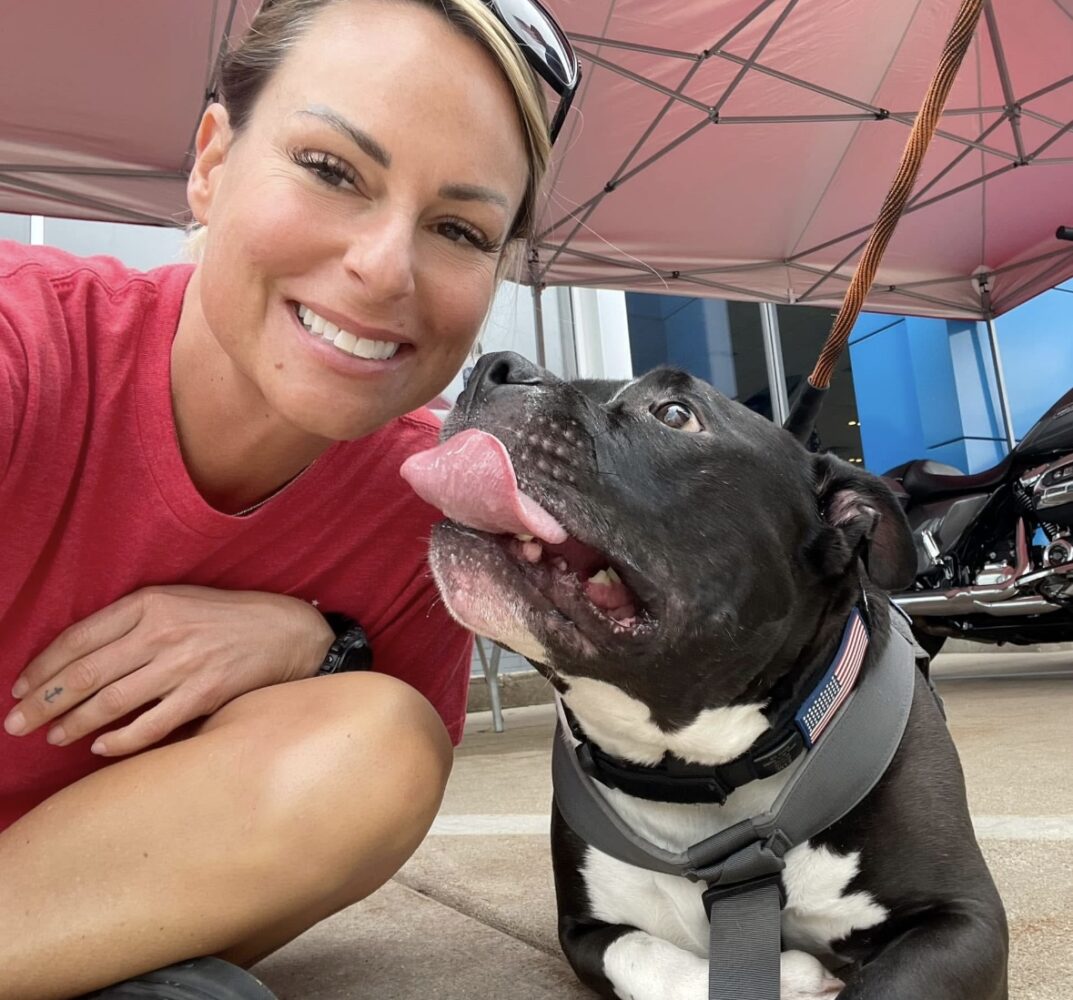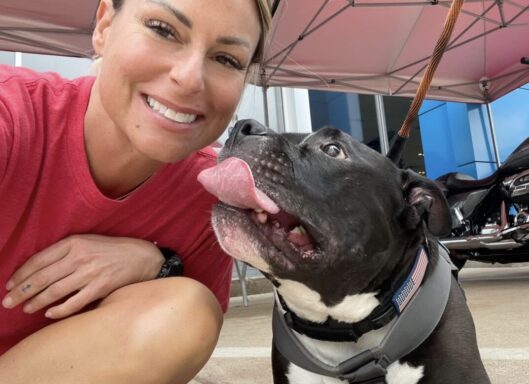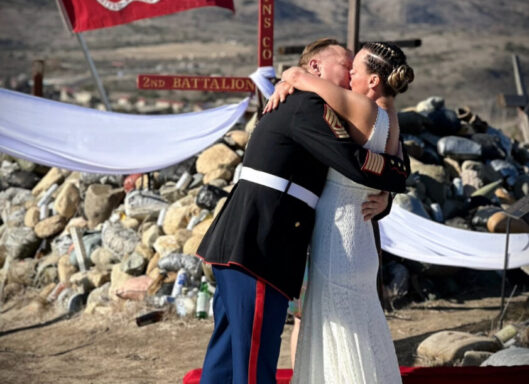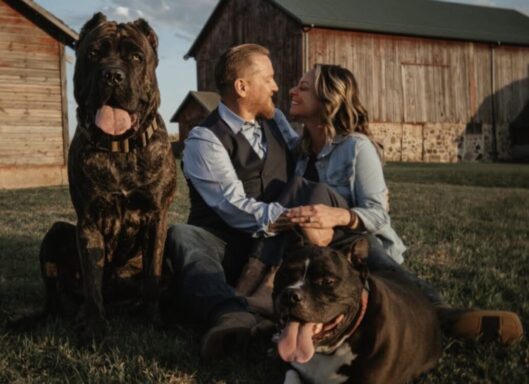
Johnson Creek, Wisconsin, is a long way from the salt spray and steel decks that shaped Shea La Sage’s life. She moved there in 2022 to begin a new chapter with her now-husband, a Marine veteran named Tim. But the road that carried her to this small Midwestern town began on a very different coastline at a very different time.
“I grew up in North Carolina and thought I’d be a social worker,” Shea says. She tried it—twice, at two community colleges—and even took a county job. “I liked the mission, but the people around me were just checking a box. That wasn’t me.”
Law enforcement ran in her family. The military did, too. Her biological father was a Marine, but their relationship had been hard, and she knew that path wasn’t for her. She started researching the U.S. Coast Guard—military service with a heavy law enforcement role—and ordered a VHS tape from Amazon to learn more. “I loved everything I saw,” she recalled. In May 2000, Shea shipped to Cape May.
Boot camp was a mental game, but one she knew how to play. When it came time to list duty preferences, she wrote “California” and asked for a small-boat station so she could keep taking classes. The Coast Guard sent her to a station near Ventura. “I’d drive to work with snow on the mountains on one side and the ocean on the other,” she says. “Everyone was smiling. I loved it.”
A year later, 9/11 changed everything. On the West Coast, the Port of Los Angeles was considered a potential next target. Security hardened overnight. Tankers sat offshore until Coast Guard teams could board them and clear them to enter. “We were busy,” Shea said simply.
To meet the moment, the service stood up national deployable teams for high-threat events on the water, often integrated with partners like Customs and the Secret Service. Shea volunteered. She thought she’d land with the team in Los Angeles; instead, her orders sent her to Galveston, Texas. “I cried driving over the causeway,” she admitted. “I didn’t think Galveston could compare to California. Little did I know I’d hardly be there; we were on the road constantly.”
There was training at Camp Lejeune. Rotations in New York Harbor. A month in St. Croix. Even a winter assignment in Wisconsin—“It was snowing and I said, ‘I’ll never go back there.’” Famous last words.
To keep advancing, the Coast Guard required time underway on cutters. Shea reported to an 87-foot patrol boat out of Panama City Beach, Florida, a small ship by fleet standards, but large enough to operate two weeks at sea with a crew of eleven. She qualified to drive the cutter at a time when few women were at the helm, led boarding teams, and maintained the armory.
In 2005, Hurricane Katrina tore across the Gulf Coast. Shea’s crew got underway before landfall, towing in a distressed solo sailor and her dog en route. When the seas calmed, they pulled into Biloxi. The casinos were mangled; the shoreline was a field of splinters and twisted metal. The crew helped wherever they could—at homes, at the station, standing watch to deter looting. “It was something to see,” she said. “The devastation, but also how people helped each other.”
In 2008, the Coast Guard created an intelligence rating, and Shea lateraled in. Her first surprise: orders to teach at the intelligence school. “I thought, ‘I’m still learning this myself,’” she recalled. So she taught navigation while she learned the rest—plotting lat/long, bridging the gap for brand-new analysts who had never been on a boat.
But life got a bit more complicated in Virginia Beach. Shea worked 12-hour day/night shifts and commuted two hours daily so her two stepdaughters could stay in their schools. At home, her marriage turned abusive. To get the girls closer to their mother, she took a recruiting assignment in Corpus Christi—far from her comfort zone, but right for the kids. The pressure mounted and depression set in.
“I was at a breaking point—depressed, exhausted, drowning in guilt,” Shea explained. Then she looked at Bane.

Bane was an American Bully pup that the neighbor couldn’t keep. Shea had already been caring for him. He was a handful—born with a leg deformity, full of energy and attitude, and in need of training and consistency. “He needed me,” she said. “I had to get up, let him out, feed him. I had to protect him.” She packed a small amount of clothing, took no furniture, and drove to San Antonio with Bane, where she took an intel billet. Her marriage was over, but Shea continued to press forward. “I say it was the grace of God,” she added. “Everything lined up.”
She deployed twice more before retiring in 2021. On the second deployment—bound for Japan during COVID—the cutter caught fire a day out of Hawaii. “Putting it out felt like three hours; it was ninety minutes,” she said. The engines held at full throttle and the crew limped into port, shaken but alive. “There was no time to be scared,” she remembered. “You do your job. Later, on land, it hits you: we could have died.”
Retirement came that September. Many veterans take a civil-service role in the same field, but Shea knew she needed space to discover who she was without a uniform. She accepted a contractor position at the FBI’s Terrorist Screening Center—good work, good pay, and a chance to erase debt before choosing a lower-paying job somewhere new. Somewhere like Wisconsin.
Earlier that year, a San Antonio cookout changed everything. A mutual friend introduced Shea to Tim, a Marine veteran from Wisconsin. “We hit it off immediately,” she said. The rest, as they say, is history.
On February 2, 2025, Shea and Tim hiked First Sergeant’s Hill in Camp Pendleton with family, friends, and packs carrying a uniform and a wedding dress. The climb is steep—a Marine PT grind of loose dirt and thin air. At the top, the Pacific spreads out below a field of flags and crosses, including a memorial to two of Tim’s teammates who never came home. The forecast called for rain, but the day arrived flawless. “It’s one of the most difficult physical and mental things I’ve ever done,” she laughed. “And the most beautiful.”

Bane, now eight, earned his service-dog certification and, despite his leg deformity and a cancer diagnosis two years ago, still sticks close. The family added Gideon, a gentle-giant Cane Corso who stands to Shea’s waist. The two dogs bicker like brothers and watch over their people like sentries.
Ask Shea what got her through the darkest moment and she doesn’t hesitate. “Bane,” she says. “He’s why I got out of bed. Why I left. Why I kept going.”
Her story isn’t tidy. It rarely is for those who served through 9/11 and the long, complicated years that followed—who boarded tankers at dawn, stood on storm-scrubbed docks in Biloxi, taught young analysts to read a chart, and drove a cutter through dark water because someone had to. It isn’t tidy for those who endured abuse, left furniture behind, and rebuilt from scratch with a dog in the passenger seat. But it is honest. And it is hopeful.

What would she tell a veteran reading this from a hard place?
“Find one thing that needs you,” she says. “A dog. A friend. A habit that gets you outside. Let it pull you forward. Teamwork saved me at sea; community saved me on land. And if you can’t see the way out yet, borrow someone else’s eyes for a little while. There’s good ahead. I promise.”
At Mission Roll Call, we believe stories like Shea’s honor service and light the path for someone else. If you’re a veteran or caregiver looking for connection, resources, or a way forward, we’re here to help. And if you have a story to share, we’re listening. Share yours here.